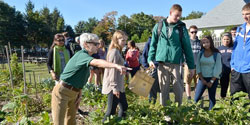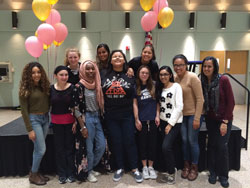Several first year seminar students visited the University’s community garden on Thursday, Sept. 19, in order to prepare for the organization of a multicultural Hunger and Heritage brunch set to happen around Thanksgiving.
Political science professor Rekha Datta runs the Debating Globalization: World Hunger class, who visited the garden. Datta said the intention of the class is to open students up to the massive impact that globalization and a fast-paced modern lifestyle have on the food industry.
A recent report released from the United Nations, which Datta referenced, said that among the seven billion people worldwide, one in eight people are chronically hungry and a large number is children.
The report also pointed out that although chronic hunger is most prominent in underdeveloped or developing countries, wealthy and established countries also contain children suffering from lack of food.
Because of widespread world hunger, Datta emphasizes, “…the impact of globalization and cultural homogenization on the distinctiveness of foods that are passed down from generations among cultures and people from different heritage.” The syllabus of the first year seminar class that the students were involved in included learning about Jewish culture and Passover foods, as well as Indian and Chinese culture.
According to Datta, it is vitally important to know this globalization impact on everyday food sources because a society always on the move is compelled to create food faster, consume it more quickly, and move onto the next task. “…[It’s] because of the pressures of a fast paced, highly interdependent world in which food production is often subject to corporate scale, GMO (genetically modified organisms), and the like. Students learn about causes and impact of food shortages, importance of local and community food production, fair trade, and activism surrounding issues of food availability and quality,” said Datta.
This is what led Datta to bring the students to the community garden, located at the corner of Beechwood Avenue and Brook Willow Avenue in West Long Branch. Robin Mama, Dean of the School of Social Work, gave a presentation about the role of the community garden and the history during the students’ visit.
As mentioned in Mama’s speech, the garden was built in 2009 as a project for the Center for Human and Community Wellness and is open to students and community members alike. Garden plots are typically sized 4×20 feet. Anyone can apply for their own plot, but community garden plots are available for public use.
Datta said the garden was created to engage students with gardening and how far down the line globalization will affect the food industry. Aside from learning of the importance of the garden and the bonding that can result from a community plot, the first year students were also introduced to a new resource on campus to engage with.
The class now faces the task of collaborating and organizing a “Hunger and Heritage Brunch,” which is scheduled to take place Tuesday, Nov. 26. Datta said the students will further their knowledge about world hunger through participating in the brunch. The event is intended to be a “simulation modeled after the Hunger Banquet,” also known as the Oxfam America Hunger Banquet where, according to their official website, “…the place where you sit, and the meal that you eat, are determined by the luck of the draw—just as in real life some of us are born into relative prosperity and others into poverty.”
In addition to giving the students a more in-depth education about the severity of world hunger, the class will also run the event to support the charity. “… [It will] also help with fundraising for local food pantries and organizations that are working to address hunger in local communities,” said Datta.
Preparations are still underway for the brunch; a location will be selected within the next couple of weeks.
PHOTO COURTESY of Jime Reme



